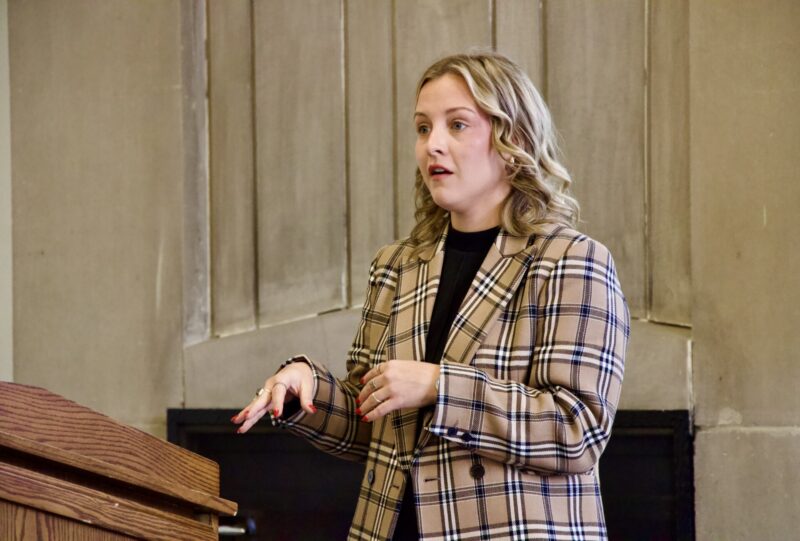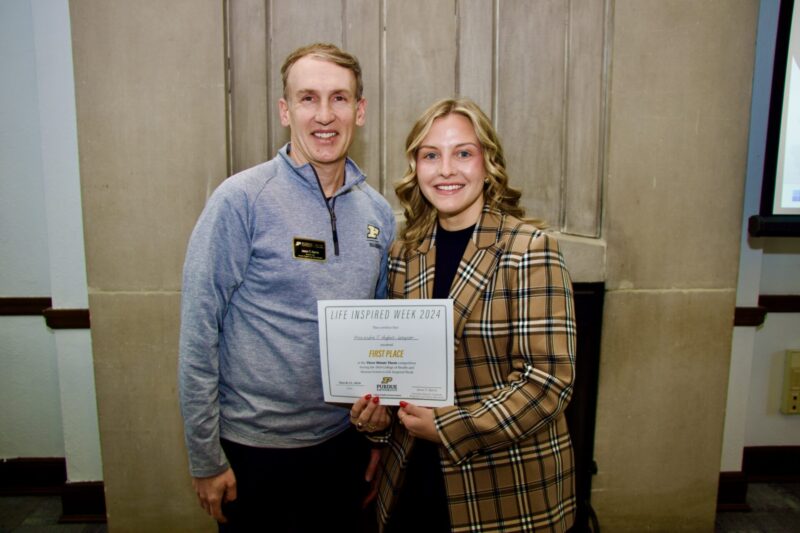Purdue Public Health research affirms salon workers key in identifying victims of sex trafficking, intimate partner violence

Alexandra Hughes-Wegner (MPH ’24) presents her research on March 22 at the 2024 HHS Life Inspired Week Three Minute Thesis competition. Her project, “Exploring the Role of Salon Professionals in Interacting and Intervening with Victims of Violence,” won top top honors.Tim Brouk
Written by: Tim Brouk, tbrouk@purdue.edu
The fight against sex trafficking and intimate partner violence (IPV) has an unexpected ally in salon professionals across Indiana and beyond, according to new work by Purdue University College of Health and Human Sciences researchers.
Drawing in student researchers from the departments of Public Health and Psychological Sciences as well as Purdue’s College of Agriculture and Polytechnic Institute, the study led by Alexandra Hughes-Wegner, a May 2024 Master of Public Health graduate, found a striking number of Indiana salon workers — estheticians, massage therapists, nail technicians, barbers and hair stylists — have come into contact with people who were victims of sex trafficking and IPV during appointments.
“Salon professionals serve as touch points for victims of sex trafficking, as they are often brought there (to a salon) for grooming purposes,” said Hughes-Wegner, whose initial research started in 2021 during her junior year of her undergraduate studies. “No state has mandatory training of salon professionals for sex trafficking, and very few have it for intimate partner violence. (The salon professionals) do not know how to identify, when to interact with victims of violence, or who to contact — specifically to get (their clients) help. By no means do we want salon professionals to put themselves in harm’s way, so who can they contact to help them help the victims?”
Hughes-Wegner and her team of undergraduate research assistants will present the data to Indiana agencies, policymakers and nonprofits in June and July. She hopes to get the work — organized in six modules or mini online classes — to be a part of the training or curriculum for a salon worker to obtain their license to work in Indiana. The modules give overviews on IPV, sex trafficking, law enforcement resources, why salon workers are needed to reduce sex trafficking and measures their salons can take when faced with clients who may be experiencing such abuse. The modules take about 90 minutes to complete in total, and they will be pilot tested by 10 Indiana salon professionals this summer. The researchers will do a couple follow-ups with them including a process and outcome evaluation.
The research was funded by a $75,000 award from the Purdue Honors College.
Strong response

Jason Harris, Purdue HHS associate dean for graduate programs and online education, poses with Alexandra Hughes-Wegner after the then Purdue Public Health graduate student accepted her first place award at the 2024 HHS Life Inspired Week Three Minute Thesis competition.Tim Brouk
Working under Andrea DeMaria, former Purdue Public Health faculty member, and Kathryn Seigfried-Spellar of the Polytechnic Institute, Hughes-Wegner and the team first interviewed 10 salon professionals across Indiana, and nine responded they have been either told outright or suspected a client had been a victim of IPV and/or sex trafficking.
The researchers then developed an Indiana-wide survey. More than 400 salon workers responded. This data fueled the study titled “Exploring the Role of Salon Professionals in Interacting and Intervening with Victims of Violence.” The biggest takeaway from the survey responses: About 45% of the respondents were directly told by their clients that they are being trafficked. Other pertinent data included:
- 74 Indiana counties were represented.
- 80.1% suspected interaction with a victim of sex trafficking.
- 88% suspected interaction with a victim of IPV.
- 51% were told directly by a client they were a victim of IPV.
The survey provided a space for workers to write their thoughts, and the feedback was eye-opening. One salon professional stated, “Educate the community more on this topic.” Another opined, “The government should provide resources to affected individuals.”
“The salon professionals wanted a training, and they wanted it to be super-collaborative, super-dynamic in that policymakers, law enforcement, and salon professionals all come together to give their shared experiences and advice on tackling this problem,” Hughes-Wegner said.
Alexandria Bedard, a May 2024 psychological sciences graduate, capped off her Purdue undergraduate research career with this project. She said she found the subject extremely important, and it will help strengthen her next academic journey as a forensic psychology graduate student at Arizona State University.
One of Bedard’s favorite parts of the research process came this spring when she helped present the project at Purdue research poster competitions. She said the work was “very eye-opening” to judges and fellow students alike, from the amount of money generated by sex trafficking nationwide ($150 billion, according to her work) to how a nail technician could save someone’s life by adeptly noticing signs of abuse.
“This research needs to be done for salon professionals not just in Indiana but everywhere,” Bedard said. “Sex trafficking made more money in the U.S. than Starbucks and Nike. I think that’s mind-blowing to a lot of individuals. They just have no clue. They never hear of it happening here in Indiana.”
Stylists/therapists
Hughes-Wegner acknowledged that salon professionals can sometimes become almost therapists to their regular clients. In some communities, the stylist is a confidant and sounding board.
“The salon plays such a large role in their lives. It’s a very unique relationship that develops where I think clients feel comfortable talking to their salon professional,” she said. “Just the unique environment and the nuanced ways that these situations kind of come up. They talk about their partners and them fighting. And salon professionals do see the bruises.”
A part of the work acknowledged the mental health of salon professionals in these situations.
“So much gets dumped on them. In a day, they may see three or four people. They know everything about them and they’re sitting in a chair one-on-one for hours. A lot of people don’t get this much access to a therapist most times,” Hughes-Wegner explained. “I do think a heavy burden is placed on the salon professionals. We’ve tried to be cautious as we develop this material because we don’t want to put extra burdens or any extra weight on the salon professionals. They aren’t trained to intervene. We just want them to know the signs so they can contact law enforcement to intervene.”
Next steps
In 2021, more than 120 sex trafficking cases were logged in Indiana.
While the team received a strong response from its survey, some salon workers did not respond, and some respondents said they never heard of clients suffering from abuse and/or trafficking. But it’s possible these professionals did have such contact and just didn’t recognize signs or cues like the bruises, bite marks and scratches.
“In Lafayette alone, we have I-65, which runs right through our backyard, and that’s known to be a facilitator of trafficking victims,” Hughes-Wegner said. “Law enforcement professionals we’ve spoken to in Lafayette get all kinds of reports and tips of this happening. I think it’s just important to be aware of it.”
Just one missed opportunity to recognize signs of abuse could put a client in danger. That’s one too many. The work of Hughes-Wegner and her team could reduce the number of missed opportunities for intervention and reduce the rates of abuse and sex trafficking in Indiana.
“I would like to see Indiana be a leader in this work and for other states to follow suit,” Hughes-Wegner said. “We know these acts of violence are very prevalent in cities all over America. With few policies in place overall, I’d like to see Indiana be a role model in this way. I would love to see a policy at the school level or at the licensing level put in place.”
Discover more from News | College of Health and Human Sciences
Subscribe to get the latest posts sent to your email.